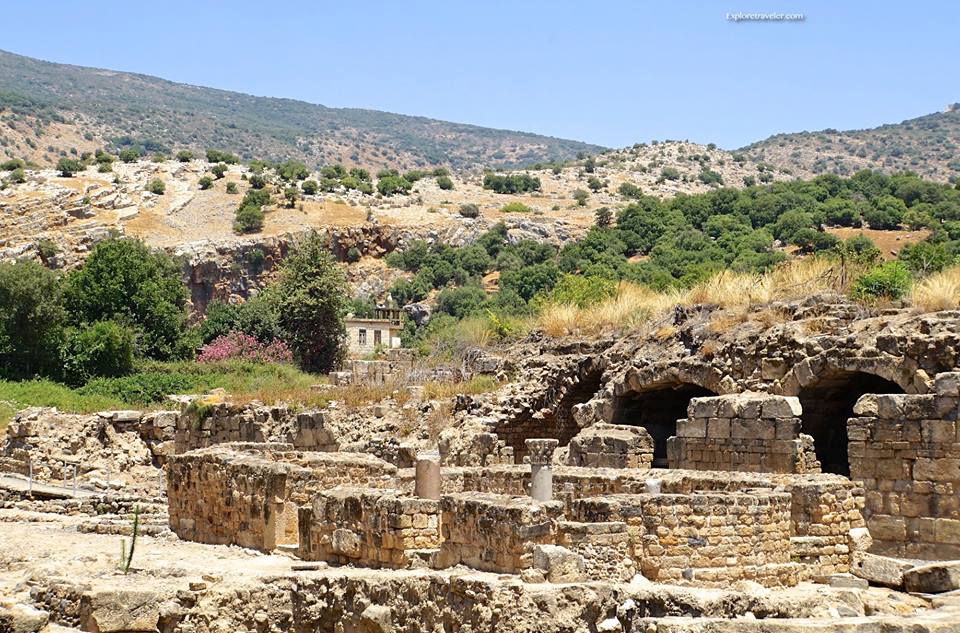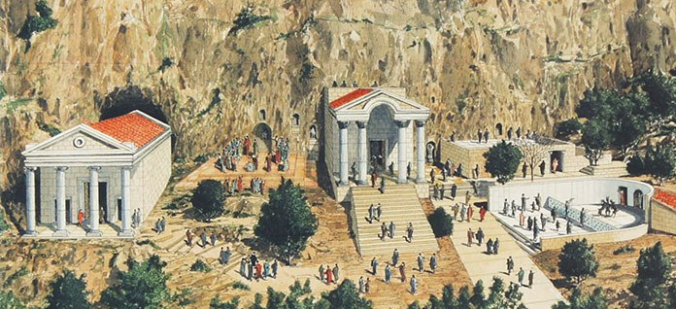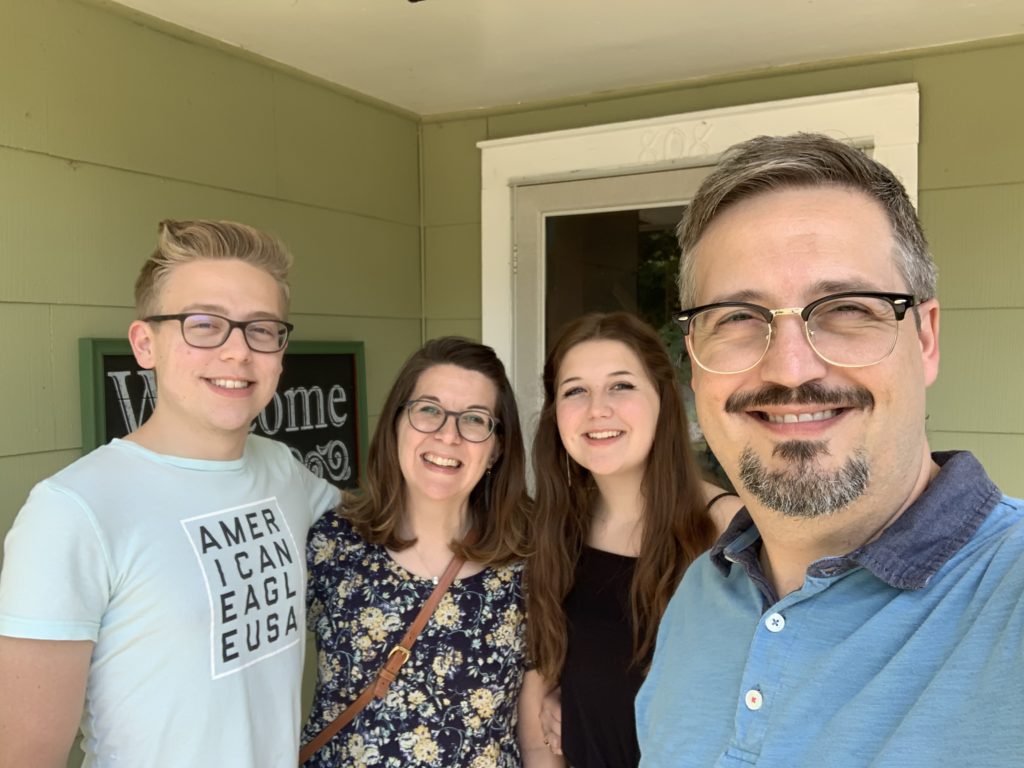“Jesus and His disciples went on to the villages around Caesarea Philippi. On the way He asked them, “Who do people say that I am?” (Mark 8:27 NIV)
This text has taken on deeper meaning since our trek to Israel last year. Caesarea Philippi was on of the scheduled stops: an enchanted forest in the Golan Heights well-watered by a giant spring erupting from a cave. Caesarea Philippi was home to the Agrippa Palace and a cult center to several false gods. You get the sense that the ancient inhabitants were continually torn about who to serve. Jesus knew that His disciples would be spiritually assaulted by the strongholds in that region: tempted to bow before Herod or any other number of idols. It’s not by happenstance that He asked this question on the path to such a spiritually accosting community.



The disciples dithered around a bit, squirming under the spotlight of Jesus’ soul inquisition.
“They replied, “Some say John the Baptist; others say Elijah, and still others, one of the prophets.” (Mark 8:29 NIV)
But Jesus suddenly didn’t seem too terribly interested in what others thought, He already knew full well what was going on in Caesarea Philippi. His first question was only a prologue to His second question: He wanted to pressed His disciples to their own place of decision.
“But what about you?” He asked. “Who do you say that I am?”
(Mark 8:29 NIV)
I believe this may be the most important question in all the Bible. I also believe it will be repeated on Judgement Day; who will we say that He is? It won’t matter what our family said or our denomination or our voter registration. Our eternity is determined by our personal response to these six words: who do you say that I am?
I can’t help but wonder if the disciples had been undecided up until this point. After all, they’d been quite busy since their paths crossed with Jesus; all the walking and talking and learning and healing, dispossessing, storm calming and dead resurrecting. Had they paused to consider what all this meant? The truth is, we can walk a good long way with God without making a conscious decision about who He is in our story. Moses spent forty years in Midian before he recognized God as Lord of his life and surrendered to divine agenda.
So why did Jesus push them to a decision on the road to Caesarea Philippi? I suspect it was because He knew exactly where they were going.
Only Peter answered, but surely the conversation sparked an internal dialogue in each of the disciples – just the way it still does for us. This pondering needs to happen in order to prepare us for the next place in our journey.
“Peter answered, You are the Messiah.” (Mark 8:9 NIV)
We like to think that Peter spoke for all, but maybe more likely he planted a seed of truth for each of travelers that day. Maybe Peter’s proclamation: “You are the Messiah” rung in their ears as they replayed the mental tape of their experiences with Jesus thus far. They had seen Him drive out demons, heal people and dispense divine forgiveness. They’d personally witnessed the transformation of lives, the crowds eagerly receiving His teaching. They’d feasted on miraculous loaves and fishes. They had pondered the parables. They’d witnessed the dead raised to life once more and they had watched the very same Healer act as Savior when He spoke to the storm. Did they add all these things up and come to the correct sum? Did they lay them against Peter’s statement “You are the Messiah” and all at once come to terms with His proper place in the Kingdom?
Jesus pressed His disciples to make a decision about who He was before they stepped into the spiritual cesspool that was Caesarea Philippi. He trusted that, if fully considered, His ministry amidst the disciples would stand out in deep contrast against the idolatry they were about to wade through.
I read this passage and I can’t help but think about my nearly-grown kids. We live in a world much like Caesarea Philippi: beset with false gods clamoring for our allegiance. It is essential that believing parents present the gospel before we send our children out into an apostate world. Not once, but again and again. We see Jesus utilizing every ordinary day with His disciples to reinforce His principles. We are asked to do the same with our offspring.

“Hear, O Israel; The Lord our God, the Lord is one. Love the Lord your God with all your heart and with all your soul and with all your strength. These commandments that I give you today are to be on your hearts. Impress them on your children. Talk about them when you sit at home and when you walk along the road, when you lie down and when you get up. Tie them as symbols on your hands and bind them on your foreheads. Write them on the doorframes of your houses and on your gates.” (Deuteronomy 6:4-9 NIV)
We have a God-given responsibility to share our faith. One of the great lies of this culture is “I’m not going to push my religion on my children. I’m going to let them choose what they want when they grow up.” Why would we send our children into battle without training or weapons? What’s more, don’t you desire to spend eternity with your family intact? If heaven and hell are real to you as a believer, how could you possibly push off that discussion until they are an adult? What if they pass before then?
No, God calls parents to share their faith. Not half-heartedly, not occasionally, but prolifically. He instructs us to build the Bible into our daily lives. He asks that we would reinforce the faith of your children. Call them to it. Present evidence. Tell the stories of God’s word; His faithfulness to generations and His specific faithfulness to you.
Right now we have a sixteen year old and a nineteen year old and most of our limited time together is spent telling stories. Rob and I try to reinforce the theme of Lordship every chance we get because our kids are going to Caesarea Philippi figuratively. Like Jesus did with His disciples, we need to prepare them to be absolutely certain about who Jesus is, because the world will do all it can to convince them otherwise.
Lord, we lift up our children today, recognizing our responsibility to train them up in the way that they should go. Strengthen our resolve. Embonlded us by Your Spirit. Help us maintain the continual Kingdom discussion that needs to happen in our homes. Amen.